66th Human Rights Day observed
Date:
- In a message delivered on the occasion of the 66th Human Rights Day, Nepali Prime Minister Sushil Koirala at a program in Kathmandu said that the new constitution will be drafted within the stipulated time, January 22, 2015.
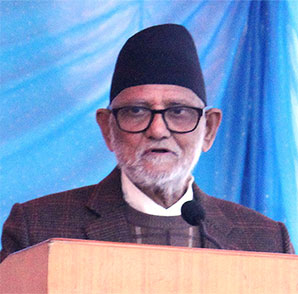
Speaking at the program organized by the National Human Rights Commission (NHRC), Koirala said, “the issues of identity, culture, language, religion are all a part of the current discussions -- in a democratic constitution, these things are bound to surface. But at least dialogues are ongoing -- there has been no major obstacles in the past months. Through discussions and dialogue, I am certain the constitution will be drafted by the 22nd’’
Recalling Nepal’s history for human rights movement he said, “Nepal has undergone a conflict and this has been going on since the Rana regime. People have been fighting for their rights since then’’. Stressing on Nepal’s potential to prosper as a nation, he underscored that despite Nepal’s abundant natural resources like hydro-energy and agriculture, the country hasn’t been able to project its full potential. “This is not a nation that should be poor. Because of the absence of democracy and a proper system, Nepalis have had to leave the country for work. It’s sad. Development is also a part of human rights.’’
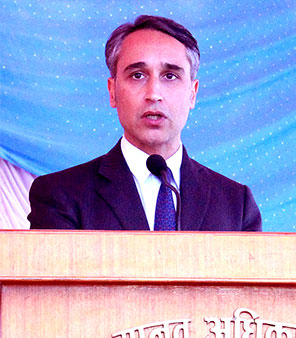
Speaking at the same program, acting UN Resident Coordinator and UN Women Representative Ziad Sheikh said that the peace process in Nepal is at a crucial juncture with many expectations hinging on the writing of a new Constitution by January 22. “Constitutions include principles, which set the stage for rights and protections. It is important for Nepal at this phase to guarantee that the provisions related to human rights of all groups’ regardless of caste, gender, socio-economic status, geographic location and political affiliation, thus ensuring the fundamental rights of Nepalese people’’ he remarked, and added “Cases of grave human rights abuses committed by all sides during the conflict should be promptly, thoroughly, independently and impartially addressed. A Truth and Reconciliation Commission and a Commission on the Enquiry for Disappeared should be established, in full compliance with both Nepali and international law. The UN encourages a holistic approach to transitional justice, consisting of National Consultations, Truth-seeking, Criminal prosecution, Reparation programmes, and Institutional reform’’

It has been eight years since the country transcended from armed conflict towards peace. Therefore, the focus on mitigating the scars of armed conflict that should lead to transitional justice delivery from human rights perspectives and advance towards the direction of drafting a sustainable and democratic constitution is constantly a matter of discussions.
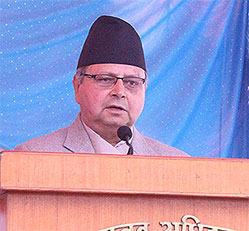
In this regard, Anup Raj Sharma, Chairman of NHRC opined that each state body needs to be effectively active in sustaining rule of law and good governance thereby putting an end to the state of impunity in the country. He further added, “the situation is such that a movement needs to be launched against gender inequality, violence against women and abuses, torture and human trafficking. Also, effective steps must be taken to ensure easy access of all communities to the basic rights including the right to education, health and shelter. In reality, human right is something that each individual and community should feel and the attention of all stakeholder parties must be drawn towards this’’.
The issue of granting citizenship to children through their mother’s name have been the matter of discussion in Nepal for a long time. As the deadline for the constitution approaches, several organizations and activists have been reiterating the need to ensure citizenship issues are rightly addressed in the new constitution.
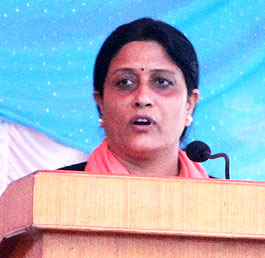
Ms. Sheikh Chand Tara, Chairperson of the National Women Commission elucidated that it wasn’t social ill practices alone that has an adverse effect on women. “The policies and laws of the State also treats women as second class citizens. The most prominent example is one of citizenship. There is still not the provision where a mother can provide her children with citizenship in her name alone’’, she said and also highlighted that better coordination is needed between National Women’s Commission, National Dalit Commission and National Human Rights Commission to achieve maximum results.
Cases of human rights violations have continued to surface. The UN had issued statements in May and September this year expressing concern for the life of Nanda Prasad Adhikari and Ganga Maya Adhikari who had been on hunger strike for 12 months to demand justice for their son, Krishna Prasad Adhikari, who was murdered during the armed conflict in 2004. Nanda Prasad Adhikari died on September 22 during his fast-unto-death.
The Resident Coordinator of the United Nations in Nepal, Jamie McGoldrick in his statement had said, “The UN did its utmost to support human rights organizations and other stakeholders in their efforts to prevent the death of Nanda Prasad Adhikari and now calls on them to come together to save the life of Ganga Maya, Adhikari’s wife.” He had called on the Government of Nepal and other key stakeholders to give justice to all victims of conflict era human rights abuses.
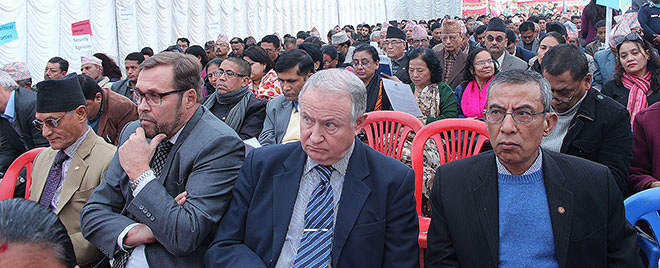
Nepal is up for the second Universal Periodic Review in 2015. The Government, NHRC, other national institutions, civil society and human rights defenders are participating in the process by implementing the recommendations of the first Universal Periodic Review.
Shared by: Bhavna Adhikari | UN Women, Nepal